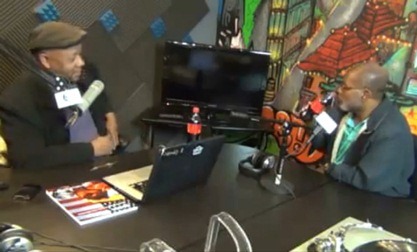 In view of the fact that Black-owned media is being squeezed out of business by the mega broadcast corporations -- whose advantages in the media industry may well be in violation of the Sherman Anti Trust Act -- a public hearing on the status of Black radio in New York was convened at the State Office Building, in Harlem New York.
In view of the fact that Black-owned media is being squeezed out of business by the mega broadcast corporations -- whose advantages in the media industry may well be in violation of the Sherman Anti Trust Act -- a public hearing on the status of Black radio in New York was convened at the State Office Building, in Harlem New York.
The hearing, the first of its kind in the nation, was held in mid-August and attracted people from throughout New York's tri-state area, including Pennsylvania. Convened by broadcaster and community activist Bob Law, participants heard three hours of sworn testimony from small business owners, directors of cultural institutions, educators, political activists and everyday listeners.
The hearing aimed to allow the African American community to express their support for Black-owned media and Black-owned radio in particular, since radio represents the most significant inroads achieved by Blacks in the electronic media to date, and it is Black owned radio that is being marginalized.
More than 100 people came to give sworn testimony that will be forwarded to the Federal Communications Commission, as the commission considers license transfers throughout the nation that, unless carefully monitored, may have a devastating effect on Black Americans.
There was expert testimony from Dr. Elisa English PhD MSW, who pointed out that a cultural, ethnic and race-based perspective is critical to the psychological, emotional, financial and social development and prosperity of any minority group. She further stated that in addition, media reports influence the formation of stereotypes and in turn stereotypes can influence behavior, social cohesion and civic life.
The testimony by Dr. English reinforced a 1997 study by the Dubois Bunche Center for Public Policy, which underscored the need for people of African descent to be able to exercise control over the editorial content of news and information coming into their community.
Renown producer and director Woodie King Jr. said that as Chairman of the Coalition of Theaters of Color, he was greatly concerned that the means to reach communities of color through Black radio are being cut off. King said that Black radio dispatched messages to our community in ways traditional White media ignored.
Betty Dopson, co-founder of the Committee to Eliminate Media Offensive to African People said: "For New York City, the leading metropolitan city to now have no Black talk radio station is an indication of corporate America's efforts to silence the voices of a people while increasing the number of talk shows up and down the dial that are hosted primarily by white men."
Dopson has joined with Bob Law, Michael North, and New York Councilman Charles Baron (D-Bklyn) in filing a petition with the FCC asking for a delay in approving the transfer of the broadcast license of InnerCity Broadcasting -- which is Black-owned -- to a Los Angeles based holding company, YMF partners. InnerCity was reportedly forced into bankruptcy in 2011.
The petition charges the FCC to nonetheless protect the interest of New York's more than 2 million Black New Yorkers.
Some speakers highlighted the danger the loss of Black ownership would have in terms of the diversity of ideas, pointing out that as early as 1945 the Supreme Court declared that the widest possible dissemination of information from diverse and antagonistic sources is essential to the welfare of the public, and that a free press is a condition of a free society.
It was also pointed out that in July of 2011, the US Court of Appeals for the Third Circuit threw out a 2007 FCC rule change that would have removed all meaningful media ownership limits. It was a rule that would have opened the door for more mega media consolidation, giving the media giants more dominance in the market place by allowing them to restrict and control the flow of information and analysis.
The court also blasted the FCC for repeated failures to consider the impact of media consolidation on broadcast ownership by people of color. Since the Supreme Court has directed the FCC to make sure the public is not ignored, this public hearing is to give Black New Yorkers a vehicle to take their concerns directly to the Federal Communications Commission, said Bob Law.
Currently in the face of a right wing media bias most Black media is restricted to race neutral and irrelevant content, being told that is the only thing White advertisers will tolerate. It was the sentiment of the community that Black-owned media is also the victim of an advertising industry basis that denies Black radio ad revenue it deserves based on how well Black radio actually performs.
That concern is supported by successful law suits recently filed against ARBITRON, the radio ratings company, by the attorney generals office of the states of New York and California, both charging ARBITRON with using a ratings scheme that dramatically undercounts Black audiences, causing sharp declines in advertising revenue and forcing many Black broadcasters out of business.
The elected officials who heard the testimonies were congressman Ed Towns, City Councilman Barron, State Senator Bill Perkins and State Assembly woman Inez Barron; they pledged to deliver the statements as well as the sentiments of their constituents directly to the FCC.
Ironically, as the Black community gathered to show it's unwavering support for Black owned media and Black owned radio in particular, the city's only remaining Black-owned radio station, WWRL AM, chose not to stand with its community as Black New Yorkers begin to come forward on behalf of Black radio.
Strange indeed.
Portland and Seattle
Free Subscription to Breaking News
Free Subscription to Breaking News





















































































































































































































































































































































